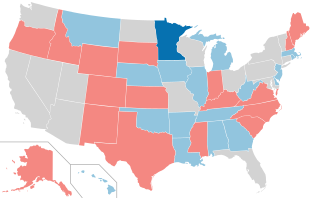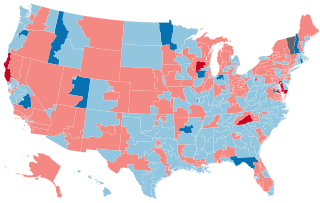
Since Hawaii became a state in 1959, it has sent congressional delegations to the United States Senate and United States House of Representatives. Each state elects two senators to serve for six years. Members of the House of Representatives are elected to two-year terms, one from each of Hawaii's congressional districts. Before becoming a state, the Territory of Hawaii elected a non-voting delegate at-large to Congress from 1900 to 1958.

Daniel Kahikina Akaka was an American educator and politician who served as a United States Senator from Hawaii from 1990 to 2013. A member of the Democratic Party, Akaka was the first U.S. Senator of Native Hawaiian ancestry.

Edward Espenett Case is an American lawyer and Democratic politician. Since 2019, he has served as the U.S. representative for Hawaii's 1st congressional district, which covers the urban core of Honolulu. He represented the 2nd district, which covers the rest of the state, from 2002 to 2007.

Mazie Keiko Hirono is an American lawyer and politician serving as the junior United States senator from Hawaii since 2013. A member of the Democratic Party, Hirono previously served as a member of the United States House of Representatives for Hawaii's 2nd congressional district from 2007 to 2013. Hirono also served as a member of the Hawaii House of Representatives from 1981 to 1995 and as Hawaii's tenth lieutenant governor from 1994 to 2002, under Ben Cayetano. She was the unsuccessful Democratic nominee for governor of Hawaii in 2002, defeated by Republican Linda Lingle in the general election.

The 1994 United States Senate elections were held November 8, 1994, with the 33 seats of Class 1 contested in regular elections. Special elections were also held to fill vacancies. The Republican Party took control of the Senate from the Democrats. Like for most other midterm elections, the opposition, this time being the Republicans, held the traditional advantage. The congressional Republicans campaigned against the early presidency of Bill Clinton, including his unsuccessful health care plan. Democrats held a 56-44 majority, after having lost a seat in Texas in a 1993 special election.

The 1990 United States Senate elections were held on Tuesday, November 6, 1990, with the 33 seats of Class 2 contested in regular elections. Special elections were also held to fill vacancies. The Democratic Party increased its majority with a net gain of one seat from the Republican Party. The election cycle took place in the middle of President George H. W. Bush's term, and, as with most other midterm elections, the party not holding the presidency gained seats in Congress. Until 2022, this had been the only election cycle where only one U.S. Senate seat flipped parties.

The 1988 United States Senate elections were elections for the United States Senate. Held on November 8, the 33 seats of Class 1 were contested in regular elections. In spite of the Republican victory by George H. W. Bush in the presidential election, the Democrats gained a net of one seat in the Senate. Seven seats changed parties, with four incumbents being defeated. The Democratic majority in the Senate increased by one to 55–to–45.

The 1982 United States Senate elections were held on November 2, 1982. They were elections for the United States Senate following Republican gains in 1980. The 33 Senate seats of Class 1 were up for election in 1982. A total of four seats changed hands between parties, with Democrats winning seats in New Jersey and New Mexico, and Republicans taking seats in Nevada and the seat of the lone independent, Senator Harry Byrd Jr., in Virginia. Democrats made a net gain of one seat bringing them to 46 seats, while Republicans stayed at 54 seats for a majority. However, the Democratic gain in New Jersey replaced a Republican that had been appointed earlier in the year.

The 1976 United States Senate elections was an election for the United States Senate. Held on November 2, the 33 seats of Class 1 were contested in regular elections. They coincided with Democrat Jimmy Carter's presidential election and the United States Bicentennial celebration. Although almost half of the seats decided in this election changed parties, Carter's narrow victory did not provide coattails for the Democratic Party. Each party flipped seven Senate seats, although, one of the seats flipped by Democrats was previously held by a Conservative.

The 1970 United States Senate elections was an election for the United States Senate. It took place on November 3, with the 33 seats of Class 1 contested in regular elections. Special elections were also held to fill vacancies. These races occurred in the middle of Richard Nixon's first term as president. The Democrats lost a net of three seats, while the Republicans and the Conservative Party of New York picked up one net seat each, and former Democrat Harry F. Byrd Jr. was re-elected as an independent.

The 1958 United States Senate elections were elections for the United States Senate which occurred in the middle of President Dwight D. Eisenhower's second term. Thirty-two seats of Class 1 were contested in regular elections, the new state of Alaska held its first Senate elections for its Class 2 and 3 seats, and two special elections were held to fill vacancies.

The 1990 United States House of Representatives elections was an election for the United States House of Representatives on November 6, 1990, to elect members to serve in the 102nd United States Congress. They occurred in the middle of President George H. W. Bush's term. As in most midterm elections, the President's Republican Party lost seats to the Democratic Party, slightly increasing the Democratic majority in the chamber. It was a rare instance, however, in which both major parties lost votes to third parties such as the Libertarian Party as well as independent candidates.

The 2006 United States Senate election in Hawaii was held November 7, 2006. Incumbent Democrat Daniel Akaka won re-election to his third full term.

The 1990 United States Senate special election in Hawaii took place on November 4, 1990. Incumbent Democratic U.S. Senator Daniel Akaka was elected to finish the term ending in 1995. He had been appointed by Governor John Waihee in April 1990 to serve temporarily after the death of Spark Matsunaga. This was the best Republican performance in a U.S. Senate race in Hawaii where the Democrat won since Hiram Fong retired in 1976.

The 1994 United States Senate election in Hawaii was held November 8, 1994. Incumbent Democratic U.S. Senator Daniel Akaka won re-election to his first full term.

The 1982 United States Senate election in Hawaii took place on November 2, 1982. Incumbent Democratic U.S. Senator Spark Matsunaga won re-election to a second term.

The 1976 United States Senate election in Hawaii took place on November 2, 1976. Incumbent Republican U.S. Senator Hiram Fong did not seek re-election to a fourth term. Democrat Spark Matsunaga won the open seat by defeating Republican William Quinn.

The 2012 United States Senate election in Hawaii took place on November 6, 2012, concurrently with the 2012 U.S. presidential election, as well as other elections to the United States Senate and House of Representatives and various state and local elections. Incumbent Democratic senator Daniel Akaka decided to retire instead of seeking a fourth full term. Democrat Mazie Hirono defeated Republican Linda Lingle in a rematch of Hawaii’s 2002 gubernatorial election. This was the first open Senate seat in the state of Hawaii since 1976.

The 1988 United States Senate election in California took place on November 8, 1988. Incumbent Senator Pete Wilson won re-election to a second term.

The 2014 United States Senate special election in Hawaii took place on November 4, 2014, the general Election Day in the United States, concurrently with other elections to the United States Senate in other states as well as elections to the United States House of Representatives and various state and local elections.























